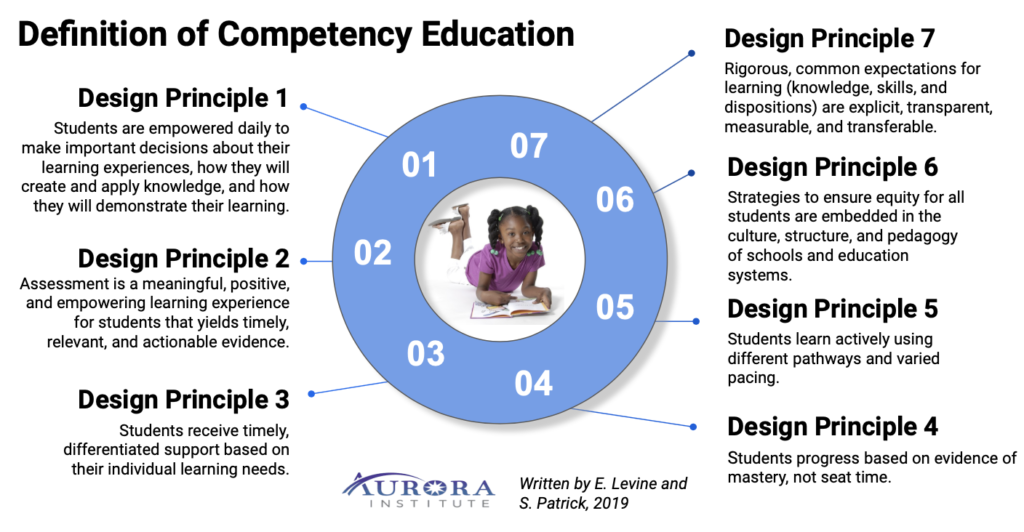Get support for student success - right in your inbox
NHLI | New Hampshire Learning Initiative
All Students Deserve a Quality Education
/ July 1, 2021
Formative Assessment: A Linchpin to Learning
In a competency-based system, “meaningful assessment” is highlighted as the second tenet (Levine and Patrick, 2019). What does “meaningful assessment” mean in a competency-based classroom? What is the role of the teacher and the student in this classroom?

(Graphic courtesy of Vander Els and Stack, forthcoming (Solution Tree))
First, we need to explore what “assessment” truly means. Assessment practices continue to evolve in competency-based classrooms. For many educators, the first word we think of when we hear the word “assessment” is “test”. But, assessment and assessment practices are different. The word “assessment” originates from the latin word “assidere” which translates “to sit beside”. What does it truly mean when students and teachers “sit beside” each other, providing feedback as a critical part of the learning process?
Additionally, we must consider the role of the day-to-day “collection of evidence” that is happening. When we ask teachers how they know where their students are in their learning, the overwhelming response is based upon more informal practices that occur in classrooms. Daily classroom practices such as observations, conversations, exit tickets, and other formative practices are the undergirding to supporting growth and must be highlighted because teachers rely on this information to determine their next steps in supporting and guiding students in progressing in their learning.
Formative Assessment as a Classroom Practice: The linchpin to supporting learning
Paul Black and Dylan Wiliam (1998) describe formative assessment as assessment that is “actually used to adapt the teaching to meet student needs.” In classrooms dedicated to learning for all, this practice is of the utmost importance. Black and Wiliam identify three major criteria of effective formative assessment:
- Teachers use assessment evidence to make adjustments to teaching and learning
- Students receive feedback during learning and are provided with advice on how they can improve
- Students are active participants in these processes through self-assessment
Margaret Heritage (2010) highlights the FAST SCASS (Formative Assessment for Teachers and Students) (Standards from the Council of Chief State School Officers) definition of formative assessment as a “planned, ongoing process used by all students and teachers during learning and teaching to elicit and use evidence of student learning to improve student understanding of intended disciplinary learning outcomes and support students to become self-directed learners.” (p. 14)
Of note, formative assessment practices are ongoing. Formative assessment as a practice is not actually a physical assessment (as opposed to a “common formative assessments” or a “summative assessment”). Formative assessment as a practice encompasses key components as outlined below by Heritage and Wylie (2020):
- Clarifying Learning Goals and success criteria within a broader progression of learning
- Eliciting and analyzing evidence of student thinking
- Engaging in self-assessment and peer feedback
- Providing actionable feedback
- Using evidence and feedback to move learning forward by adjusting learning strategies, goals, or next instructional steps
The role of metacognition within formative assessment practices is critical. Students who are self-aware, who set goals, and who are able to successfully monitor and adapt these goals are engaging in practices that empower them as learners (Design Principle 1). They own their learning in ways that haven’t been the norm in our schools. But students can’t do this alone. Teachers must create, scaffold, and champion the time and systems that allow students to practice these skills, develop these skills, and ultimately take ownership for their continued application of these skills-true agency.
Teachers who begin to consciously and explicitly embed these practices in their classrooms notice an immediate impact. Tony Doucett, a social studies teacher from Souhegan High School remarked that he “noticed that (formative assessment) is ultimately helping (him) become a better teacher, as these skills are helping (his) students understand and take ownership of their learning better.” Tony went on to say that learning about formative assessment and how to integrate these practices “directly impacted (his) classroom practice more than any other professional development (he had) experienced.”
As our collective educational quest to engage in more balanced assessment practices takes on greater import, the role of formative assessment practices in our classrooms will take on a greater role in the day-to-day. If we are truly striving to empower students in their learning, and personalize their experiences, students must be participants in the process. Formative assessment practices allow students to not only meaningfully master the intended content, but also to become the self-directed learners a competency-based and personalized system of education strives to develop.
About the Author:
Jonathan G. Vander Els directs innovative, competency-based projects for the New Hampshire Learning Initiative and is co-author of Breaking With Tradition: The Shift to Competency Based Learning in PLCs at Work (Solution Tree, 2018). Formerly, Jonathan was a principal in an elementary school recognized nationally as a model professional learning community and competency-based school. Jonathan has consulted, coached, and presented at conferences and institutes throughout the United States, and lives with his wife and three children on the NH Seacoast.
Categories: Competency-Based Learning (CBL) Formative Assessment
